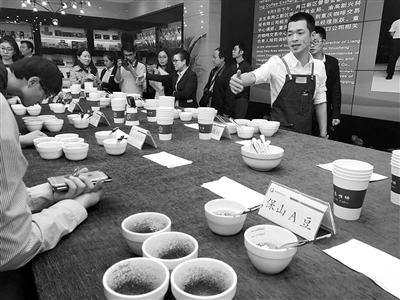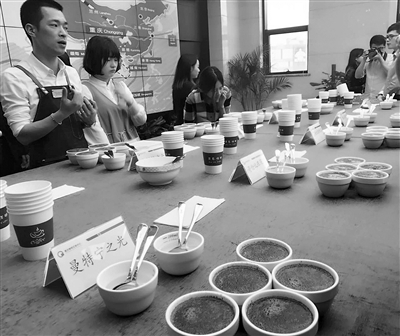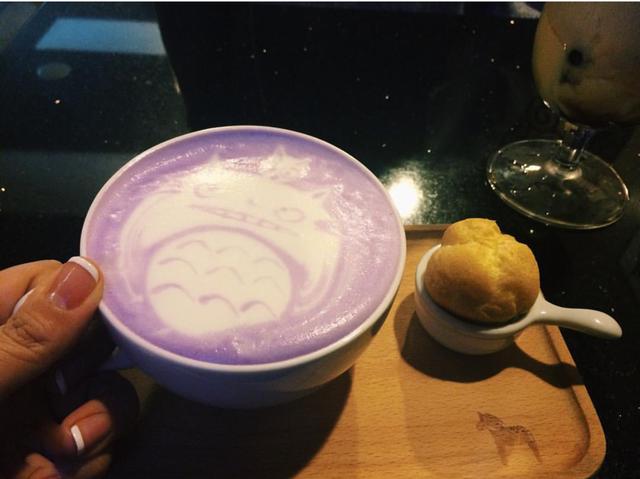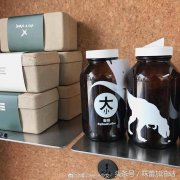Technology lags behind and keeps a low profile. Yunka is confused about its appreciation.



For professional baristas, please follow the coffee workshop (Wechat official account cafe_style)
The picture shows the Chongqing Coffee Trading Center jointly established by Chongqing Energy Investment Group and Yunnan Dehong Hongtian Industrial Group. The center aims to solve the problems of asymmetric information, weak price say and lack of promotion platform for farmers.
The "Coffee bulk Trade Standard testing system", led by the Chongqing Coffee Trading Center, has been implemented during the 2017 coffee harvest season and strives to promote it into a national standard. In addition, the center publishes the reference price of coffee transactions every day and, through information services, feedback the trends of the international market and customer demand to local coffee growers in Yunnan as soon as possible, while improving the quality of domestic coffee, promote the development of the coffee industry to the end market and to the high end of the industrial chain.
Photo taken by our reporter Liu Yin
Liu Yin, a reporter of our newspaper
Yunnan accounts for more than 95% of the country's coffee output, but it is difficult to exchange one kilogram of coffee beans for a cup of coffee? Recently, such a report made the rather "low-key" Yunnan coffee hit the headlines coldly.
According to data released by the Yunnan Coffee Association, during the 2015-2016 harvest season, the average price of 1 kilogram of coffee beans purchased by enterprises from curry farmers is between 13 yuan and 14 yuan, and the market trade price is maintained at around 16 yuan.
What is the problem behind the numbers? From a coffee bean "evolution" to a good cup of coffee, where is the room for Yunka to appreciate? How to break through the tight encirclement and enter the international market for Chinese coffee, mainly in Yunnan?
The selling price is dismal. This is not always the case.
"at present, the price of coffee in Yunnan is OK, and the price of ordinary raw beans is about 20 yuan per kilogram." Qiu Minghua, a researcher at the Kunming Institute of Botany of the Chinese Academy of Sciences and director of the China Coffee Engineering Research Center, said that "one kilogram of coffee beans cannot be exchanged for a cup of coffee." it may be an analogy to those low-end and unbranded coffee. it does not represent the development level of coffee in Yunnan as a whole.
"the diffuse coffee brand uses Colombian and Brazilian coffee beans, which cost about 70 or 80 yuan a kilogram of raw beans. Although the price advantage of Yunnan coffee is obvious, the quality is not stable and has not been adopted at present. " Jiang Nianbao, CEO of Beijing Man creation Food and Beverage Management Co., Ltd., told Science and Technology Daily that Yunnan coffee bean supply chain and industrial chain have not yet been developed, and domestic sales are mainly low-end coffee. In addition, there is no professional organization to do quality assessment, many coffee shops do not dare to use Yunnan coffee.
By the beginning of 2016, China had planted more than 1.8 million mu of coffee, with a total output of about 140000 tons, accounting for 1.5 per cent of the world's total output. More than 70 countries in the world produce coffee, and there are 21 countries and regions with an output of more than 100000 tons. China is one of them.
What is quite touching to Qiu Minghua is that Yunnan, with a total output of 139000 tons, accounting for more than 95 percent of the country's coffee, still leaves the impression of "coffee beans packed in sacks, unreliable quality and unstable consistency." Obviously, the recognition of Yunnan coffee is not high.
Make good use of natural endowments and don't "spoil" them.
Yunnan has geographical and climatic conditions suitable for coffee growth, including Dehong, Baoshan, Pu'er, Lincang and Xishuangbanna. The total planting area of coffee is as high as 1.77 million mu, and the total output accounts for more than 95% of the country.
"most of the world's best coffee comes from high-altitude areas, such as Ethiopia and Kenya." Qiu Minghua said that Yunnan has the fertile soil given by nature to grow coffee in terms of altitude, humidity and temperature. However, the development of Yunka has some "acquired deficiencies". For example, some farmers use too many pesticides, and there is not enough consistency in the technological details of the whole producing area.
To measure the quality of coffee beans, the first thing is whether there are pesticide residues and heavy metal pollution, and then the aroma, sour taste, alcohol thickness and other qualities will be considered. The development of Yunka represents the status of Chinese coffee in the world to a large extent. However, for a long time, Yunnan has mainly sold raw raw materials of coffee and raw beans, and there is little profit margin.
"the planting technology is not standard, the industry lacks standards, and farmers sell coffee fruits of different quality together. Yunnan coffee, which is lagging behind in the initial processing, is mainly exported from raw materials. " Chen Zhenjia, executive director of the China Coffee Engineering Research Center, said frankly that this has led to the general instability of coffee quality in Yunnan, and it is difficult for many coffee enterprises to produce coffee beans of the same quality for two years in a row, which is also the fundamental reason why the price of coffee in Yunnan has always been slightly lower than the international price.
Lack of matching quality is difficult to guarantee stability
"although coffee has been grown in China for more than 100 years, the coffee industry has developed in the past 20 years. The planting area has developed too fast, the quality is difficult to control, and the supporting science and technology has failed to keep up." It is a pity that Chen Zhenjia, who has been engaged in coffee brand and pest research for a long time, has failed to keep up with the breeding of varieties, the planting model has not been well improved, and the level of processing and standards are not unified, resulting in a lack of continuous stability of coffee quality.
Chen Zhenjia said that Yunnan coffee still lacks import and export standards. The export of coffee with good stability and good quality can maintain the reputation and status of China's coffee industry in the world. If there are standards and brands, they will have a say and can make their own pricing. As for non-standard imports, when foreign coffee with uneven levels is mixed and sold together, the interests of consumers can not be protected.
"Man Coffee is considering Yunnan coffee beans, which are currently being tested, but they have to be supplied in accordance with our standard requirements. Inferior coffee beans will affect the overall quality." Jiang Nianbao told reporters that since last year, the quality of Yunnan coffee beans has improved rapidly, as long as it has opened up the supply chain and industrial chain of high-end coffee beans, Yunka's future will be very promising.
In 2016, Yunnan produced about 140000 tons of coffee beans, of which Nestl é bought 10000 tons of coffee beans, Starbucks bought 8000 tons, and some were sold to coffee companies in Europe, the United States and other countries. It has made a lot of progress compared to 2015. In 2015, the country produced 138000 tons of coffee, exported 87000 tons and imported 91000 tons.
"the price sold is 30 yuan per kilogram, and the price bought is 80 yuan per kilogram, which means we exchange three or four kilograms of coffee beans for one kilogram of coffee beans from abroad." Chen Zhenjia once again took out the data and said, "if coffee is to grow into a big industry, it needs state investment, market guidance, science and technology, and financial support." Over the years, the state has invested only one billion yuan. "
In Qiu Minghua's view, Brazilian coffee beans can be sold for 80 yuan / kg, which should be the price of selected beans for "Brazilian coffee", but on the other hand, Yunnan coffee beans still have a lot of room for appreciation. In Yunnan, where there are "ten miles of different days", the top priority is to keep the coffee quality consistent and traceable in each piece of land, and then enter high-end products to build national coffee brands in Yunnan and even China.
Build a brand to compete for the pricing power of coffee
"at present, more than 60% of Yunnan coffee is sold overseas, but it is mainly primary coffee beans with low added value, and the end market is not strong enough. the main problem is that national brands have not been formed." Chen Zhenjia said that only by improving the quality and building a brand, Yunnan coffee can have a place in the international market.
However, Yunnan coffee still faces difficulties on the way to building its brand. "large foreign-funded enterprises are depriving growers of the market price they should have, and it is only natural that coffee quality should be linked to the price, but coffee trading is mainly dominated by developed countries in Europe and the United States, and we do not have the right to say or set the price." Chen Zhenjia said that for a pound of coffee of the same quality, Yunnan coffee is 20 cents cheaper than Colombian coffee, which is thousands of dollars less than 10 tons.
"at present, it is generally recognized that the evaluation system of the American Fine Coffee Association rates coffee in terms of aroma, flavor, acidity, purity and so on." Qiu Minghua said that to integrate into American standards, Chinese coffee products will naturally be challenged. "on the basis of using big data to analyze the chemical composition of coffee, we are promoting the construction of coffee evaluation index and system to scientifically evaluate coffee beans in terms of purity, acidity and aroma."
Recently, the reporter walked into the Chongqing Coffee Trading Center, a mountain city that did not produce a single coffee bean, but started a coffee business along the "Belt and Road Initiative" route, successfully docking China's Yunnan, Southeast Asia and other major coffee producing areas with the European market, and forming radiation and agglomeration to the global coffee industry.
"Chongqing Coffee Trading Center vigorously promotes Yunnan coffee brands, linking coffee quality to price." Chen Zhenjia said that the raw coffee beans exported by Yunnan Dehong Hougu Coffee Co., Ltd. account for about 40% of China's total exports. At the end of last year, the largest freeze-dried coffee production project in China was settled in Chongqing bonded Port area, and the intelligent instant coffee production line independently developed by Hougu Coffee was exported for the first time, realizing the transformation and upgrading from the export of raw materials to the export of technical equipment.
Important Notice :
前街咖啡 FrontStreet Coffee has moved to new addredd:
FrontStreet Coffee Address: 315,Donghua East Road,GuangZhou
Tel:020 38364473
- Prev

Coffee is no longer a monotonous curry color, cartoon purple unique pull flowers
Curry color is named after the color of coffee, although later matcha mocha and other appearance of course also have green coffee, but have never seen purple coffee, for the first time can not help but exclaim that this is a dreamy color
- Next

A coffee shop hidden in Beijing hutong
Professional barista communication please pay attention to the coffee workshop (Wechat official account cafe_style) the coffee shop hidden in the hutong, the small space and the big ideal is the theme of this coffee shop is hidden in the bait alley the size of coffee next to the fat girl noodle shop is indeed this coffee shop is very small, about 5.6high stools, I arrived before eight o'clock barista let me go in first, although small but small.
Related
- Unexpected! Ruixing Telunsu lattes use a smoothie machine to foam milk?!
- % Arabia's first store in Henan opens into the village?! Netizen: Thought it was P's
- Does an authentic standard mocha coffee recipe use chocolate sauce or powder? Mocha Latte/Dirty Coffee/Salty Mocha Coffee Recipe Share!
- What is the difference between Vietnam egg coffee and Norway egg coffee? Hand-brewed single product coffee filter paper filter cloth filter flat solution!
- What is the difference between sun-cured and honey-treated coffee? What are the differences in the flavor characteristics of sun-honey coffee?
- How to make Italian latte! How much milk does a standard latte use/what should the ratio of coffee to milk be?
- How to make butter American/butter latte/butter Dirty coffee? Is hand-brewed coffee good with butter?
- Is Dirty the cold version of Australian White? What is the difference between dirty coffee/decent coffee and Australian white espresso?
- Relationship between brewing time and coffee extraction parameters How to make the brewing time fall to 2 minutes?
- Got entangled?! Lucky opens a new store, Mixue Ice City, and pursues it as a neighbor!

